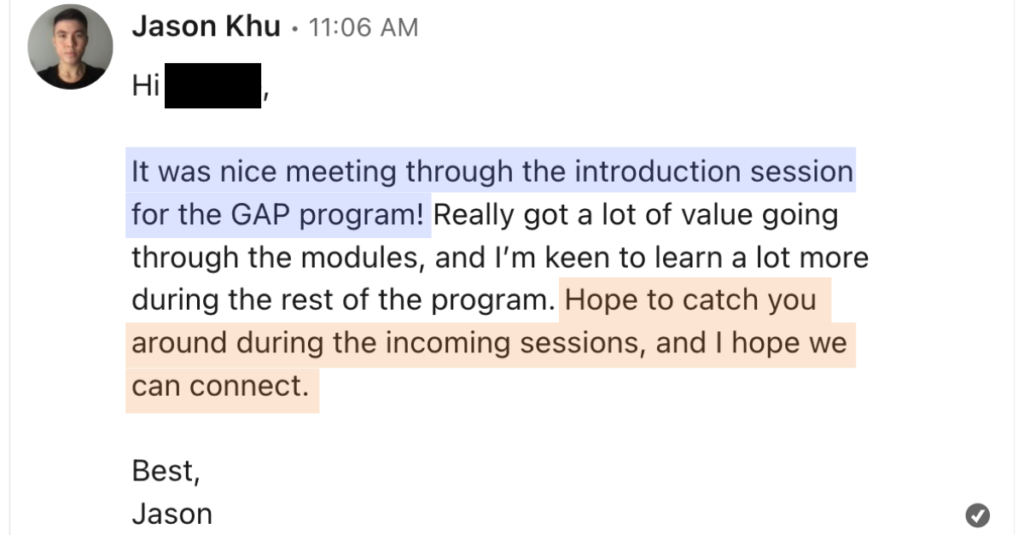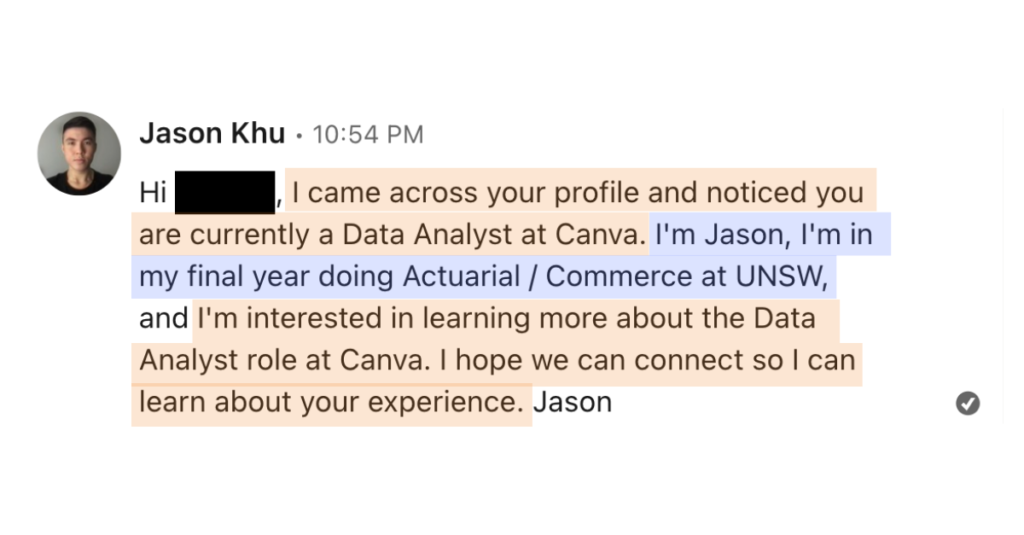Learn how to land a grad job – from Jared Chuah
Posted on: January 22, 2023
Post Category: Book Notes

Many large and mid-tier companies have a graduate program, which are for recruiting fresh University graduates.
Jared Chuah’s ‘How To Get A Grad Job’ is a book for University students who study Commerce or, more generally, want to build a career in business. It covers a wide range of tips for students to build their brand, build their network, and get further in the graduate program application process.
Over time, application processes will change. However, most of the content in this book is still relevant, and I would recommend it to students in their early years of University, as it also helped me.
Here are 5 key takeaways that will help you shape your Uni experience and land the grad role you want:
1. Invest (more) time in extracurricular activities and work commitments
In today’s graduate market, it is now expected that graduates are “well-rounded” in their experience – meaning to have a wealth of both life and work experience.
For more lucrative industries, like investment banking, management consulting and high-frequency trading, there are still strict grade/mark requirements. But otherwise, for most graduate roles/programs, your grades/marks do not matter as much.
Many companies are caring less about (good) grades, and for most application processes, your grades (i.e., your GPA/WAM) become less relevant the further you progress. There may be a minimum WAM cut-off when submitting your initial written application, but the rest, and the bulk, of the application process will typically involve online assessments, assessment centres and interviews.
Experiences like volunteering, working a part-time job, going on exchange and getting involved in a vacationer program (i.e. doing an internship over the summer Uni break) will help you build your network and the soft skills that many firms are ACTUALLY looking for, like communication, leadership and resilience.
2. Network online and through (networking) events
Networking online and through events will allow you to build your online personal brand, and learn more about organisations and their student/graduate programs.
LinkedIn is a popular platform for recruiters to hire, and for professionals to connect. When networking online, have a complete LinkedIn profile (with a clear headshot profile photo, clear headline, etc.) and always connect with people with a personalised note. Below are examples of connection requests I have sent – one being a follow-up, and the other being a cold-message to someone already working in the industry. Here are some guidelines when writing connection requests on LinkedIn:
- For following-up (i.e., you’ve met the person before), mention when and where you engaged with them, and share that you hope to keep connected with them.
- For cold messaging (i.e., you have not met this person before), introduce yourself and highlight your intentions for connecting.
Feel free to use these examples as inspiration for any templates you wish to write/save.


Networking events can provide invaluable insights for students, about different organisations. Representatives who are current graduates could offer insights into the program and company culture, while representatives who are in HR could offer insights into what they look for in their candidates.
Here are a few tips when going to networking events:
- Arrive early
- Ask thoughtful questions (that can’t be answered using a simple Google search) and actively listen
- Take mental notes from your conversations; the insights may be helpful when applying for their grad/student programs
- Connect with them afterwards on LinkedIn, with a personalised note thanking them for the conversation
3. Have an idea of what you want
Ultimately, you should have an idea of what kind of work you want to do and where. This is because you should apply for roles that interest you; that way, you’re more likely to enjoy the role you receive an offer for.
To get an idea, consider the size of the company and consider what industry interests you.
Here are some benefits of working in the Big 4 (i.e. PwC, Deloitte, EY, KPMG):
- Internationally-recognised brand
- Larger clients
- Support available for attaining accreditations like CA (Chartered Accountants)
- Better secondment opportunities
Here are some benefits of working in a mid-tier company:
- Develop broader skills
- Culture is less political, hierarchical and competitive
- Oftentimes, lower working hour expectations and better work-life balance
- Oftentimes, higher wage per working hour
To help get an idea of what industry interests you, do your research, list down a couple of industries, and connect and have an informational interview with people who are already working in them.
4. Be clear and concise during the initial written application stage, and customise your resume
The first stage of a graduate/student program application process usually involves submitting online written application responses and/or a copy of your resume.
Here are a few tips to write clear and concise responses to online questions:
- Use the STAR (situation, task, action, result) structure to highlight key skills you’ve demonstrated from previous experiences
- Research the organisation, including cultural values, what they pride themselves in and their recent ‘wins’, and mention those when answering motivational questions (e.g. ‘Why do you want to join [Company name]?’ or ‘Why do you want to join your preferred business units/teams?’)
- Use signposting
- Before submitting your responses, step away then come back to proof-read for mistakes.
- While you are waiting for the status of your application, check the online forum, Whirlpool, for other applicants’ progress on their application.
Resumes need to be short, sharp and specific, and, depending on the industry, you could give your resume a makeover. Recruiters tend to give 6 seconds to read each resume, so you could stand out from the crowd by including video links, a link to your personal website, or by simply customising the formatting using a tool like Canva.
5. Be proactive and engaged during online interviews, assessment centres and final (in-person) interviews
For an online interview, treat it like a normal in-person interview:
- Prepare appropriate answers
- Imagine an interviewer sitting on the opposite side of the camera
- Make eye contact with the camera, use hand gestures and be genuine
For an assessment centre, you’ll typically be given a case study, and you’ll be asked to work with the other candidates for some time before presenting a solution. During the assessment centre, be a supportive team player who takes initiative:
- Participate in every activity
- Try play devil’s advocate
- Volunteer to scribe or keep the time
- Bring in quieter members into the discussion
- Don’t overpower others – don’t be loud and dominant
For the final in-person interview, be genuinely interested in the role and company, and engage with the interviewers:
- Prepare for common interview questions (e.g., ‘Tell me about yourself’ and ‘Why do you want to work here?’)
- When responding to behavioural questions, use the STAR structure and focus on your contributions
- Use body language when responding, and have a conversational tone
- Always ask questions at the end
- Google-search your interviewer if you are given their name, and use their experience to tailor the questions you ask at the end of the interview
- Send a sincere ‘thank you’ email to the interviewers for the opportunity
In the unfortunate case that you fail, at the assessment centre stage or later, ask for feedback so you can improve on your future applications.
And those were the 5 key takeaways!
For more key takeaways and other posts about personal/professional development, see more of my posts at jason-khu.com, follow me on LinkedIn, or see the rest of my ‘Uni for students’ guide here.

About the author
Jason Khu is the creator of Data & Development Deep Dives and currently a Data Analyst at Quantium.
Notice:
Let me know if you want a resume review from me.
I have written a Data Analyst resume checklist, which will be free for you to read when my Data Analyst Guide gets released on the 3rd of June, 2024.
But if you want specific feedback from me, delivered in a short 30-minute to 1-hour call...
Please let me know through LinkedIn, and I'll see what I can arrange!
Pricing TBD.
- Jason